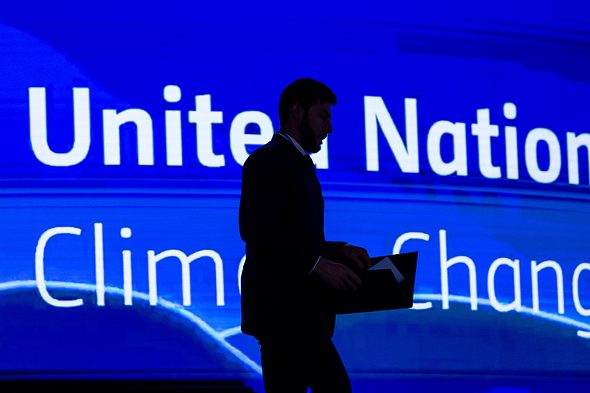By then, the talks, which began on Sunday 6 November, had been log-jammed for most of the previous fortnight. On day 12, last Thursday, Guterres flew in from the G20 meeting in Bali and looked visibly shocked by the atmosphere he found. The doom he had warned of seemed to be unfolding. “There has been clearly, as in past times, a breakdown in trust between north and south, and between developed and emerging economies,” he warned. “This is no time for finger pointing. The blame game is a recipe for mutually assured destruction.”
By Saturday afternoon, the talks stood on the brink of collapse. “This is the worst Cop I’ve ever known,” said one longtime Cop attender. Countries were still far apart, not only on loss and damage but on the key issue of action to bring down greenhouse gas emissions. Oil-producing countries and some big emitters were trying to water down commitments on fossil fuels.
What eventually broke the impasse was intense negotiations, all through Friday and Saturday nights with barely a break, backed up by wider pressure from civil society, and—crucially—what was effectively a capitulation by the developed countries. The Sunday morning deal that was greeted with euphoria by developing countries for the loss and damage fund was being damned as a severe disappointment by most of the rich world.
Frans Timmermans, vice-president of the European Commission, said: “What we have in front of us is not enough of a step forward for people and planet. It does not bring enough added efforts from major emitters to increase and accelerate their emissions cuts. It does not address the yawning gap between climate science and our climate policies. The EU came here to get strong language agreed and we are disappointed we didn’t achieve this.”
Alok Sharma, the UK president of last year’s Cop26 talks in Glasgow, was even more scathing. The UK’s key achievement a year ago was to “keep 1.5 C alive.” Limiting global temperature rises to 1.5 C above pre-industrial levels is vital, according to scientists, as beyond that threshold, the cascading impacts of climate breakdown will quickly become catastrophic and in some cases irreversible.
“Those of us who came to Egypt to keep 1.5 degrees alive, and to respect what every single one of us agreed to in Glasgow, have had to fight relentlessly to hold the line,” Sharma told the conference on Sunday morning. “I said in Glasgow that the pulse of 1.5 degrees was weak. Unfortunately, it remains on life support. And all of us need to look ourselves in the mirror, and consider if we have fully risen to that challenge over the past two weeks.”
How could a deal hailed as “historic” and world-changing by so many poor countries be such a bitter blow to those fighting for the 1.5 C limit?
Some of the blame must lie with the oil-producing countries that blocked stronger text on 1.5 C. “Saudi Arabia was the worst, and they’re the worst at every Cop,” says Ashwini Prabha, of the Global Gas and Oil Network, a climate campaigning group. The Egyptian presidency was also sharply criticized, called “untransparent, unpredictable and chaotic” by one senior attender.
But if the rich countries want to understand why they did not get the deal they wanted, they will also have to examine their own actions over the past fortnight of talks in Sharm el-Sheikh—and learn the lessons for future conferences.
The fortnight of talks kicked off with everyone listening to world leaders. From the start, the issue of financial help for developing countries took center stage. Sameh Shoukry, the Egyptian foreign minister and Cop27 president, stressed that this was an African Cop, focusing on those countries’ needs. “African countries, as well as most developing nations, have expectations that the priority issues that they deem fundamental should be achieved, [to create] trust between developed and developing countries,” he told the Guardian in an interview before the summit. “Cop27 is the venue where that trust can be enhanced and consolidated.”
Despite repeating that they were willing to discuss loss and damage, however, the rich countries failed to make much progress on it. Developing countries were clear and united in their demands: They wanted a new fund, dedicated solely to loss and damage, that would be able to disburse funding quickly when countries were struck by disaster. “It’s no use having funding that comes three weeks later, if you’re hit by a hurricane,” said Seve Paeniu, finance minister of Tuvalu.
A new fund was exactly what the EU, and to a lesser extent the US and the UK, did not want. Instead, they wanted a “mosaic” approach that would involve funding from many different existing institutions, such as the World Bank and other development banks, existing climate funds such as the Green Climate Fund and Global Environment Facility, and national funds. “I know from experience it takes time to establish a fund, and more time to fill it,” said Timmermans. “Whereas we have existing instruments.”
That did not wash with poor nations and campaigners. Teresa Anderson, global lead for climate justice at ActionAid International, said: “We’ve heard endless speeches from developed nations saying they care, but all they want to do is kick the can down the road when it comes to establishing a financing facility to address loss and damage.”
Then, in the early hours of last Friday morning, the EU made an abrupt U-turn. Having argued vehemently against a fund from the outset, suddenly they wanted to set one up. “We have listened to the developing countries,” Timmermans told journalists at 8 a.m. that day. “Since they are so attached to a fund, we have agreed.”
There was a catch: The donor base for any such fund must be expanded to include countries that were classed as developing when the UN Framework Convention on Climate Change was signed in 1992, and thus carry no obligations under the treaty, but which have since had burgeoning emissions and rapidly growing economies. Chiefly, that meant China, the world’s second biggest economy, responsible for more cumulative greenhouse gas emissions to date than any country apart from the US.










